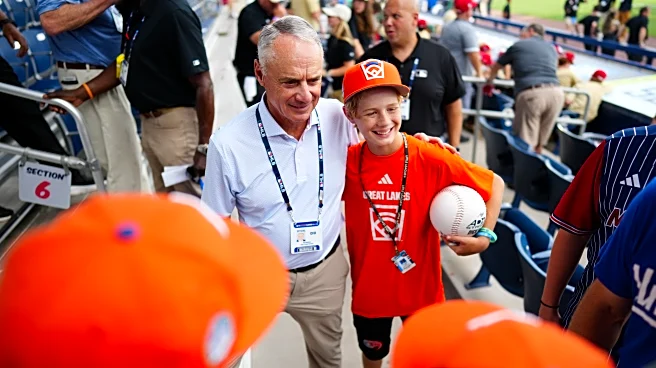Commissioner of baseball, Rob Manfred, made his annual visit to the Little League World Series, Sunday, August 17 for the broadcast on ESPN’s Sunday Night Baseball of the Little League Classic. During
his interview, Manfred emphasized his desire to expand MLB to 32 teams and realign the two leagues to address geographic travel issues for the players as well as improve the postseason scheduling.
“I think if we expand, it provides us with an opportunity to geographically realign,” Manfred said during the broadcast, which featured the Seattle Mariners and New York Mets. “I think we could save a lot of wear and tear on our players in terms of travel. I think our postseason format would be even more appealing for entities like ESPN because you’d be playing out of the East, out of the West and that 10 o’clock where we sometimes get Boston-Anaheim would be two West Coast teams. That 10 o’clock slot that’s a problem for us sometimes becomes a real opportunity for our West Coast audience.” –The Athletic
Manfred has also stated that he would like the expansion to be decided before he leaves his role in 2029. His choice to discuss this topic on a national broadcast during the LLWS highlights that this issue continues to be a major goal of his remaining time as commissioner.
After his comments, many outlets weighed in on how the expansion and realignment would work. The models reflect different priorities, but some dominant points include preserving traditional rivalries between teams and decreasing the wear and tear of long travel on players. This is especially true for western teams as they lose sleep going east and must play with more issues of fatigue compared to eastern teams traveling west and gaining time.
Fox Sports, The Athletic and ESPN, to name a few, have weighed in on how these alignments could look. The common thread is that 32 teams can only be divided up one of two ways. You either have eight divisions of four teams of four divisions of eight teams.
The eight-team divisions would probably require more teams to change leagues in order to keep the geographic proximity within the divisions. If you divide the teams into more divisions then league integrity would not be as disrupted. But either way, at least a couple teams would have to change leagues in order to make the geographic divisions make sense.
Fox Sports came out in favor of the eight-team division model with the map and divisions based completely on geography.

There are many teams changing leagues in this model and it puts both LA teams in the same league and division as well as both NY teams in the same league and division. It adds two expansion teams, one in the West and one in the Southeast.
The model promoted in The Athletic by Stephen J. Nesbitt, protects the major rivalries and has less teams changing leagues.


There are two league changes in this model with the Colorado Rockies and Tampa Bay Rays switching leagues. It also adds the two new expansion teams in the West and the Southeast.
ESPN also had an article on its website that shows what a four-division/eight-team per division model could look like. It requires many teams changing leagues and would divide the country into West and Central for the NL and South and East for the AL. It also reduces the season to 154 games.
The playoff picture would be another big consideration with the new model. The current 12-team configuration would not be decreased, but with eight divisions it could be increased. If the option is to stay with 12 teams, then the division winners would all have automatic slots and there would be four wild cards. There could also be an increase to 14 teams with the eight division leaders and six wild card teams.
It seems inevitable that this will happen in the near future, but with the resistance to change that many traditional baseball fans have, the final configuration could lead to a lot of controversy. So far, the other changes that Manfred has shepherded in baseball have had some short-term controversy, but have otherwise resulted in an overall positive reception.
Fans will like that the game times that have to be dealt with by eastern fans with western games would be less of an issue when their teams travel across country a lot less. And western teams will have much less east coast fatigue in their seasons.
If baseball can maintain the integrity of traditional rivalries, this should be a net win for baseball.











